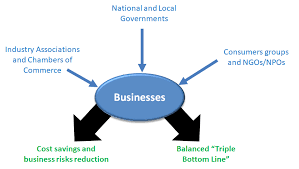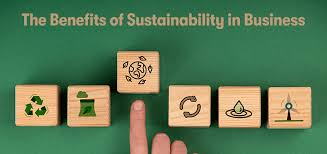Introduction to Sustainable Business Practices
Sustainable business practices refer to operations that consider the long-term impact on the economy, environment, and society. In the contemporary business landscape, characterized by heightened awareness of environmental concerns and social accountability, integrating sustainability into business operations has become increasingly essential. Companies today are not only evaluated on their financial performance but also their commitment to practices that support ecological balance and social equity.
At its core, sustainability in business encompasses economic viability, environmental stewardship, and social equity. This multifaceted approach requires organizations to weigh their actions against a broader set of criteria that extends beyond mere profit maximization. As a result, businesses are now inclined to evaluate their supply chains, energy usage, waste management practices, and labor conditions to foster a more responsible operational model. This shift in focus serves to mitigate risks associated with environmental regulations and societal expectations, while simultaneously meeting the demands of increasingly conscientious consumers.
Moreover, the integration of sustainable practices can yield significant benefits for organizations, including enhanced operational efficiency and cost reductions. By aligning with sustainable principles, businesses can identify wasteful processes and implement strategies to reduce their carbon footprint, thereby leading to financial savings. For instance, energy-efficient technologies and sustainable materials not only lower operating costs but also resonate well with customers who favor environmentally responsible companies.
Given the pressing challenges of climate change and resource scarcity, adopting sustainable business practices is not merely an option but a necessity. As we navigate through the complexities of today’s global economy, it becomes imperative for businesses to harness sustainability as a catalyst for innovation, growth, and resilience. This overview sets the groundwork for a deeper exploration into how sustainable practices can be leveraged to enhance operational efficiency and contribute to cost reduction in the following sections.
Understanding Operational Efficiency
Operational efficiency is a measure of how effectively a business utilizes its resources to produce output while minimizing waste and costs. It represents the ability to deliver products and services to customers in the most streamlined manner possible. Key metrics used to assess operational efficiency include productivity ratios, utilization rates, and the overall effectiveness of process management. By evaluating these indicators, businesses can pinpoint inefficiencies and areas for improvement, paving the way towards enhanced performance.
To quantify operational efficiency, organizations employ various methodologies, such as Lean and Six Sigma, which focus on minimizing waste and maximizing value. Metrics like overall equipment effectiveness (OEE) and cycle time are instrumental in identifying inefficiencies in production processes. Additionally, companies might use financial ratios, such as return on assets (ROA) or profit margin, to gauge the effectiveness of their operations from a financial perspective. By understanding these metrics, businesses can gain valuable insights into their operational landscape.
The relationship between operational efficiency and sustainability has gained significant attention in recent years. As businesses strive to become more environmentally responsible, optimizing operations often translates to both reduced costs and improved ecological impact. Sustainable practices, such as reducing energy consumption, streamlining supply chains, and implementing recycling programs, not only conserve resources but also enhance operational efficiency. Furthermore, organizations that prioritize sustainability are often perceived more favorably by consumers, leading to increased customer loyalty and brand reputation.
Ultimately, enhancing operational efficiency is paramount for businesses aiming to thrive in competitive markets. By measuring and optimizing their operations, companies can achieve significant cost savings while simultaneously contributing to broader sustainability goals. This synergy between efficiency and sustainability is integral for creating a resilient business model equipped to face the challenges of the future.
How Sustainability Enhances Operational Efficiency
The relationship between sustainability and operational efficiency is increasingly recognized as a vital connection in contemporary business practices. By implementing sustainable practices, organizations can significantly enhance their operational efficiency, leading not only to cost savings but also to improved overall performance. Key strategies that promote this symbiotic relationship include resource optimization, waste reduction, and energy efficiency.
Resource optimization involves minimizing wasteful consumption of materials and utilizing resources more effectively. For example, companies can adopt practices such as just-in-time inventory management, allowing them to reduce excess stock and lessen storage costs. Businesses that employ sustainable supply chain management can optimize logistics, thus minimizing transportation costs and lowering their carbon footprint simultaneously. By doing so, organizations become more agile and economically viable while adhering to sustainability principles.
Waste reduction is another essential element of sustainable business practices. Implementing strategies such as recycling and composting enables organizations to decrease the amount of waste sent to landfills. A notable instance is the automotive industry, where companies like Toyota have introduced lean manufacturing principles. This approach not only reduces waste but also enhances production efficiency by streamlining operations, which results in significant cost reductions and improved workplace safety.
Energy efficiency is a critical factor for businesses aiming to improve operational performance while reducing costs. By investing in energy-efficient technologies, such as LED lighting and energy-efficient machinery, organizations can substantially lower their energy consumption. Notable examples include Google’s commitment to operating on renewable energy, which has resulted in significant savings on utility costs. This strategic shift not only meets environmental goals but also fosters operational resilience.
Ultimately, integrating sustainability into business operations fosters a culture of efficiency and innovation. By adopting resource optimization, waste reduction, and energy-efficient practices, companies can enhance their overall operational performance while contributing positively to environmental sustainability.
Cost Reduction Through Sustainable Practices
Implementing sustainable practices within a business framework can lead to substantial cost savings across several operational areas. One of the most significant advantages of sustainability is the reduction in energy consumption. By utilizing energy-efficient technologies and renewable energy sources, companies can dramatically decrease their utility expenses. For instance, transitioning to LED lighting, optimizing heating and cooling systems, and investing in solar panels reduces the energy footprint and subsequently lowers the monthly energy bills.
Additionally, adopting waste management and recycling initiatives contributes to reduced raw material costs. Efficient waste management practices minimize the amount of waste sent to landfills, which in turn can result in lower disposal fees. Furthermore, reusing materials and incorporating recycled inputs can lead to notable financial savings by diminishing the reliance on costly new raw materials. By focusing on the circular economy, businesses are not only conserving resources but also generating a steady supply of materials, which significantly cuts operational costs.
Beyond these direct financial benefits, sustainability boosts a company’s corporate image and brand reputation. With heightened consumer awareness surrounding environmental issues, businesses adopting green practices are often viewed more favorably. This enhanced reputation can translate into increased customer loyalty, thereby driving sales and enhancing profitability. Many consumers are willing to pay a premium for sustainable products or services, establishing a direct relationship between a company’s commitment to sustainability and its financial performance.
In summary, investing in sustainable practices is not merely an ethical choice but a strategic financial decision. By reducing energy consumption, minimizing raw material costs through recycling, and enhancing corporate reputation, businesses can achieve significant cost reduction and drive financial growth. It becomes evident that sustainability and cost efficiency are intertwined, setting the foundation for long-term operational success.
Case Studies: Successful Implementation of Sustainability in Business
Various organizations have demonstrated the successful integration of sustainability into their operations, showcasing the potential benefits and effectiveness of such practices. One prominent example is Unilever, a global consumer goods company that has embraced sustainability by committing to reduce its environmental footprint. Unilever’s Sustainable Living Plan has guided its initiatives to improve health and well-being, halve the environmental impact of its products, and enhance livelihoods within its supply chain. Through this plan, the company reported substantial reductions in greenhouse gas emissions and improved resource efficiency, thereby enhancing its operational efficiency and significantly reducing costs.
Another compelling instance is that of Tesla, which has positioned itself as a leader in the electric vehicle market. By prioritizing renewable energy sources and emphasizing sustainability in its manufacturing processes, Tesla has not only captured the attention of environmentally-conscious consumers but also achieved notable economies of scale. The challenges faced by Tesla included high capital investment and navigating supply chain complexities, yet the result has been a stronger competitive advantage and increased profitability.
Similarly, Patagonia, the outdoor apparel company, has differentiated itself by prioritizing environmental sustainability through its business practices. By implementing recycling initiatives and ensuring responsible sourcing of materials, Patagonia has managed to maintain its profitability while actively promoting ecological stewardship. The company faced hurdles regarding consumer perceptions and market competition, but its commitment to sustainability has fostered a loyal customer base that supports its mission.
These case studies illustrate that the integration of sustainable practices within businesses leads to notable improvements in operational efficiency and cost reduction. By adopting ecological strategies, companies have not only enhanced their brand reputation but also aligned themselves with the growing consumer demand for environmentally responsible products and services, proving that sustainability can be a driver of competitive success.
Measuring the Impact of Sustainability on Efficiency and Costs
In the contemporary business landscape, where sustainability is pivotal, companies are increasingly recognizing the importance of measuring their sustainability initiatives’ effectiveness. Assessing the impact of these initiatives on operational efficiency and cost structures requires a systematic approach facilitated by specific tools and metrics. Key Performance Indicators (KPIs) play a crucial role in this evaluation process.
Firstly, organizations should consider adopting energy consumption metrics. Tracking energy use over time can help assess the effectiveness of energy-efficient practices. For instance, measuring the reduction in energy usage can highlight savings that directly impact operational costs. Additionally, businesses may utilize carbon footprint metrics to gain insight into their greenhouse gas emissions, guiding them toward more environmentally friendly practices that can subsequently improve efficiency and reduce expenses.
Another essential tool for measuring sustainability’s impact is the lifecycle assessment (LCA). This comprehensive evaluation method enables businesses to assess environmental impacts associated with various stages of a product’s life, from raw material extraction to disposal. By conducting LCAs, companies can identify opportunities for improvement that may lead to reduced costs and enhanced operational efficiency.
Implementing a sustainability scorecard can also provide businesses with a holistic view of their progress. This scorecard can include various KPIs, such as waste reduction, water usage, and sustainable sourcing metrics. Regularly updating this scorecard allows organizations to track their sustainability efforts effectively, equipping them to pivot as necessary to meet evolving environmental and economic challenges.
Moreover, benchmarking against industry standards can provide valuable insights into where a company stands relative to its competitors. This comparative analysis can aid in identifying gaps and areas for potential improvement, motivating organizations to enhance their sustainability initiatives further, thus promoting operational efficiency and cost savings.
Challenges in Implementing Sustainable Practices
Implementing sustainable practices within a business framework often presents numerous challenges that can hinder effective transition. One of the primary obstacles is the resistance to change from employees and management alike. This resistance can stem from a lack of understanding or awareness of the benefits of sustainability, leading to skepticism about the need for change. Addressing this challenge requires comprehensive training programs and awareness initiatives, which can help to cultivate a culture of sustainability within the organization.
Another significant challenge is the initial costs associated with adopting sustainable technology. Many businesses perceive the up-front investment required for eco-friendly technologies as prohibitively expensive, especially for small and medium enterprises. However, it is essential to recognize that these initial costs can be mitigated by considering long-term savings and operational efficiencies. For instance, implementing energy-efficient systems may incur a high initial cost, but substantial savings on energy bills can be realized over time, ultimately yielding a positive return on investment.
Moreover, the complexity of adapting supply chains to align with sustainability goals presents yet another hurdle. Businesses may struggle with reshaping their procurement processes, ensuring compliance with environmental regulations, and maintaining transparency throughout their supply chain. Conducting a thorough evaluation of current practices, along with adopting innovative distribution strategies, can help to simplify this process. Collaborating with suppliers who prioritize sustainability can also strengthen the entire supply chain and foster smoother transitions.
Overall, while the challenges of implementing sustainable practices can be daunting, they are not insurmountable. By fostering an inclusive corporate culture, reassessing financial priorities, and simplifying supply chain adaptations, businesses can successfully navigate these challenges and advance toward sustainable operational practices.
Future Trends in Sustainable Business Practices
The landscape of sustainable business practices is evolving rapidly, influenced by various factors such as technological advancements, shifting regulatory environments, and increasing consumer expectations. As organizations strive to align their operations with sustainability goals, several emerging trends are shaping the future of operational efficiency and cost management strategies.
One significant trend is the incorporation of advanced technologies, such as artificial intelligence (AI) and the Internet of Things (IoT), into sustainable business models. These technologies facilitate real-time monitoring of resources and energy consumption, enabling companies to identify inefficiencies and optimize their operations. By leveraging data analytics, businesses can make informed decisions that not only reduce costs but also minimize their environmental footprint. Investments in renewable energy sources, like solar and wind, are also gaining traction as companies recognize the long-term cost savings and sustainability benefits associated with these alternatives.
Regulatory requirements are another driving force behind the adoption of sustainable practices. Governments worldwide are enacting stricter environmental regulations to combat climate change and promote sustainable development. Consequently, businesses must adapt their practices to comply with these mandates, often leading to increased operational efficiency. Companies that preemptively adopt sustainable practices may benefit from reduced regulatory risks and potential incentives, ultimately enhancing their market competitiveness.
Furthermore, consumer expectations are evolving as individuals demand greater transparency and accountability from businesses regarding their sustainability efforts. Companies that prioritize sustainable practices are likely to gain a competitive edge by fostering customer loyalty and trust. Brands that effectively communicate their commitment to sustainability can not only enhance their public image but also attract a more environmentally-conscious customer base, increasing overall revenue potential.
As these trends continue to shape the business environment, companies that proactively embrace sustainable practices will likely experience improved operational efficiency and significant cost reductions in the long term.
Conclusion: The Business Case for Sustainability
In today’s rapidly changing business environment, the integration of sustainable practices has emerged as a pivotal strategy that transcends corporate responsibility. Companies are increasingly recognizing that sustainability is not merely an ethical obligation but a vital approach for enhancing operational efficiency and reducing costs. The evidence supporting this shift is profound and multifaceted.
Firstly, adopting sustainable practices can lead to significant cost reductions. By optimizing resource consumption, such as energy and raw materials, businesses can decrease their operational expenses. Efficient waste management and recycling initiatives further contribute to lowering costs by minimizing the need for waste disposal and reducing procurement expenses. These financial benefits are complemented by the increasing availability of sustainable technologies that provide competitive advantages through improved efficiency.
Moreover, embracing sustainability enhances a company’s reputation and brand image. Consumers are becoming increasingly conscious of environmental issues and are more inclined to support businesses that demonstrate a commitment to sustainability. This consumer preference not only fosters brand loyalty but also opens doors to new markets and customer segments, thus driving revenue growth.
Furthermore, sustainable business practices can improve employee morale and productivity. Companies that prioritize sustainability tend to have a more engaged workforce. Employees often feel a sense of pride in working for a business that cares for the environment and society. This positive workplace culture leads to improved performance and lower turnover rates, ultimately contributing to the company’s bottom line.
In conclusion, the case for sustainability is compelling, as it provides distinct advantages that extend beyond traditional metrics of corporate performance. By integrating sustainable practices, businesses can achieve significant operational efficiencies, enhance their reputation, and establish a competitive edge in the marketplace. As the business landscape evolves, the adoption of sustainability will increasingly emerge as a hallmark of successful and forward-thinking companies.
How useful was this post?
Click on a star to rate it!
Average rating 0 / 5. Vote count: 0
No votes so far! Be the first to rate this post.









